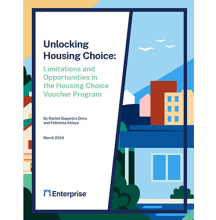Rachel Bogardus Drew
Rachel Bogardus Drew is a senior research director with the Policy Development & Research team at Enterprise Community Partners. She conducts quantitative analyses and studies of important policy issues around affordable housing, housing and community development, housing finance, homeownership, and housing supply and demand concerns. Her work focuses on demand-side analyses of the affordable housing crisis, climate and disaster resilience, and the intersections of housing policy and racial equity.
Rachel was formerly a research associate and post-doctoral fellow at the Joint Center for Housing Studies at Harvard University, where she managed and co-wrote the “State of the Nation’s Housing” report for six years. She has a bachelor’s degree in economics from Dartmouth College and a doctorate in public policy from the University of Massachusetts. Her doctoral dissertation studied the role of socially constructed messages about homeownership and its benefits on the tenure preferences of renter households. She is based in the Enterprise Community Partners’ Boston office.

Boston
399 Boylston Street
Boston, MA 02116








